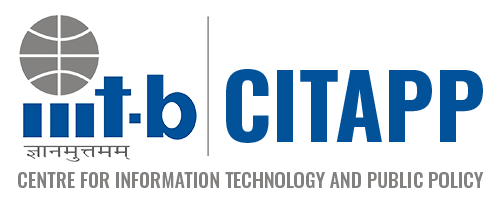Date: 4-1-2019 to 7-1-2019
Description: Research Students and Faculty members of Centre for Information Technology and Public Policy (CITAPP) participated in the tenth edition of ICTD held at IIM Ahmedabad during January 2019. The international conference on Information and Communication Technologies and Development (ICTD) is organized every 12-18 months, and brings together researchers and practitioners working across domains, sectors, and disciplines to study the role of ICT in social, political, and economic development ( www.ictdx.org ).
Following is a list of open sessions organized and posters and doctoral consortium:
Open Sessions
Beyond IVR: Voice-User Interfaces for Emerging Smartphone Users
With the steady growth of smartphone users and increasing number of mobile Internet users, new types of voice user interfaces—such as voice-based search and voice assistants—are becoming an integral part for smartphone users’ everyday lives. Following the long-term interest of the ICTD community in user interfaces for users in developing contexts, we aim to host an unconference to bring together like-minded individuals to develop a research agenda for these interfaces among underserved communities.
Apoorva Bhalla
Bidisha Chaudhuri
Linus Kendall (Sheffield Hallam University and IIIT Bangalore)
Do Digital Identity Systems Have a Theory of Inclusion?
Designing a national scale unitary digital ID system in democratic regimes can be better understood as a wicked problem which are well served by adopting systems-thinking approaches that explicitly engage with the inherent complexity rather than rationalizing them away. In this session, we engage with diverse perspectives on complexity drawn from the disciplines of computer science, law, and public policy to engage with questions concerning inclusion in digital ID designs and infrastructure.
Bidisha Chaudhuri
Open Government Data and Accountability: Hype, Reality or a Possibility?
Open Government Data (OGD) refers to making government data publicly available through online portals to enhance transparency of the State towards citizens. Many national and regional governments are adopting OGD world over. Yet, we don’t fully understand how the availability of such datasets influences the existing mechanisms of citizen-State engagement. Does it make the citizens negotiate more effectively with the State? Does it make the State more accountable to citizens? Or does it only “empower the empowered” while leaving out the more disempowered? In this session, we seek to understand the practitioners’ perspective on the impact of OGD.
Rajesh Hanbal
Sham Kashyap (Azim Premji University)
Gender Equality in the Indian IT Workplace
We want this panel discussion to start a dialogue amongst practitioners and policy makers about the experiences of being a woman in the Indian IT workplace. We are hoping this will bring out the hidden nuances of these experiences and give these women a suitable platform to share and even discuss them.
Oindrila Matilal
Mounika Neerukonda
Posters
A Rights-based approach to Open Government Data
Rajesh Hanbal and Amit Prakash
The Datafication of Anti-Poverty Programmes: Evidence from the Public Distribution System in Karnataka
Soumyo Das and Silvia Masiero (Loughborough University)
Doctoral Consortium
A Multi-Objective Optimization Framework for Task Automation
Arvind Upreti
“Seeing the State” through Open Government Data (OGD)
Rajesh Hanbal
Gender and Development in the Digital Social Enterprise
Oindrila Matilal
